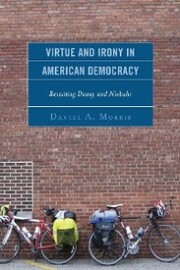Detailansicht
Virtue and Irony in American Democracy
eBook - Revisiting Dewey and Niebuhr
ISBN/EAN: 9781498500753
Umbreit-Nr.: 2087441
Sprache:
Englisch
Umfang: 280 S.
Format in cm:
Einband:
Keine Angabe
Erschienen am 01.07.2015
Auflage: 1/2015
E-Book
Format: EPUB
DRM: Adobe DRM
- Zusatztext
- <span><span>What virtues are necessary for democracy to succeed? This book turns to John Dewey and Reinhold Niebuhr, two of Americas most influential theorists of democracy, to answer this question. Dewey and Niebuhr both impliedalthough for very different reasonsthat humility and mutuality are important virtues for the success of people rule. Not only do these virtues allow people to participate well in their own governance, they also equip us to meet challenges to democracy generated by free-market economic policy and practices. Ironically, though, Dewey and Niebuhr quarreled with each other for twenty years and missed the opportunity to achieve political consensus. In their discourse with each other they failed to become one out of many, a task that is distilled in the democratic rallying cry </span><span>e pluribus unum</span><span>. This failure itself reflects a deficiency in democratic virtue. Thus, exploring the Dewey/Niebuhr debate with attention to their discursive failures reveals the importance of a third virtue: democratic tolerance. If democracy is to succeed, we must cultivate a deeper hospitality toward difference than Dewey and Niebuhr were able to extend to each other.</span></span>
- Kurztext
- <span><span>Virtue and Irony in American Democracy: Revisiting Dewey and Niebuhr</span><span> offers original, accessible democratic-virtue readings of Dewey and Niebuhr, showing implications for political responses to economic inequality on the basis of the virtues they imply. </span></span>
- Autorenportrait
- <span><span>Virtue and Irony in American Democracy: Revisiting Dewey and Niebuhr</span><span> offers original, accessible democratic-virtue readings of Dewey and Niebuhr, showing implications for political responses to economic inequality on the basis of the virtues they imply. It includes an innovative critique of the Dewey/Niebuhr debate, arguing that these two prominent theorists of democracy failed to exhibit an important form of tolerance in their engagement with each other.</span></span> <span></span>
